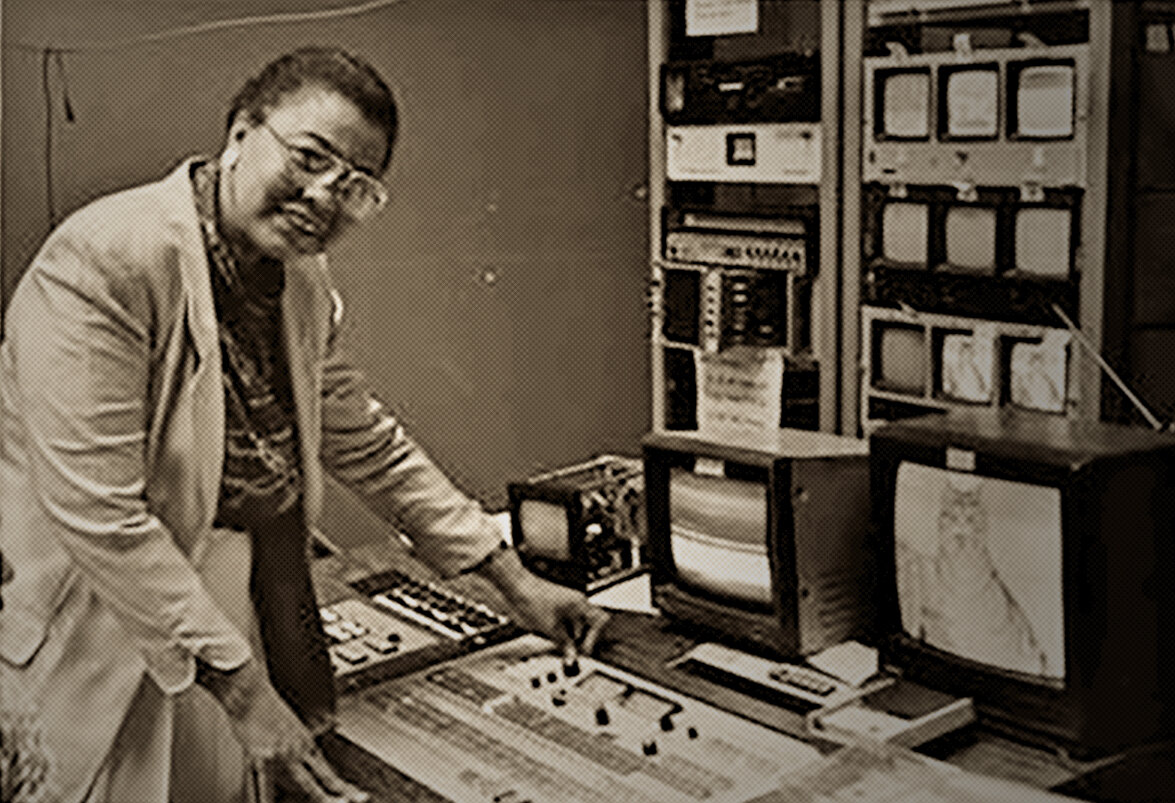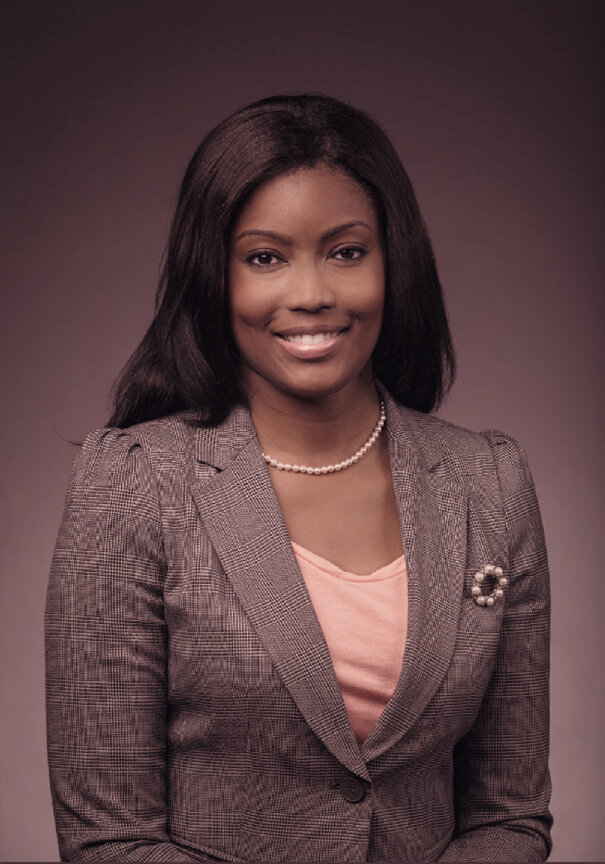Dorothy E. Brunson
The First Black Woman to Own and Operate Radio and Television Stations
Dorothy Brunson, owner of WEBB (1360 AM) is pictured in her office.
Dorothy Brunson was a leading expert in radio marketing and management, but more than that, her business acumen led her to the forefront of two languishing radio stations she resuscitated to profitability. In time, she would elevate beyond those lofty heights to the history-making position of radio station owner, being the first black woman to own and operate one via her purchase of Baltimore station WEBB, which she acquired in 1979 as part of Brunson Communications, Inc. for $485,000. WEBB was rescued from bankruptcy under its previous owner, soul legend James Brown. Brunson ascended beyond these levels and made history again by becoming the first black female owner of a television station.
Dorothy Edwards Brunson was born on March 13, 1939, in rural Tattnall County Georgia where she spent her early years. Her parents were Wadis and Naomi Edwards. Four younger siblings would follow over time, but the family moved to Harlem, New York, a new, far different environment that essentially shaped Brunson’s worldview. She attended New York public schools, where her focus was the arts. She studied photography, fashion, drama, and advertising, but in a 1986 interview with the Baltimore Sun, Brunson, speaking candidly, said:
“But I needed something more.”
That need drove her back to school, specifically SUNY Empire State College in Saratoga Springs, New York. She graduated in 1960, earning a bachelor's degree in finance and accounting, and worked in retail and print communications for four years. The transition to radio came in 1964 when she was hired by Sonderling Broadcasting to work at WWRL as the assistant controller at a salary of $70 per week.
Brunson’s knowledge, determination, and efficiency allowed her to rapidly advance in the company. She was promoted to controller in three months, and when she left in 1969, she was assistant general manager and corporate liaison to the company’s board of directors. In the same Baltimore Sun interview, Brunson said of her time at the company:
“When I first came to WWRL, yearly advertising billings were around $700,000. By the time I left, they had grown to nearly $5 million.”
Dorothy Edwards became Dorothy Brunson after marrying James Brunson in 1964. Less than a decade after completing her studies, she launched her first historic entrepreneurial endeavor as the co-founder of Howard Sanders Advertising, which existed as the first full-service Madison Avenue advertising agency of its kind in the United States: one dedicated to black Americans. Though it was not the first black ad agency in the country, a write-up in the New York Times hailed its founding as “revolutionary.” Howard Sanders once sold radio advertising, but he decided to launch his own business with Brunson as his partner. The agency failed after a few years, because—as Sanders put it when speaking to the New York Times in 1976:
“Black agencies no longer served a useful purpose in this economy with the event of Nixon and the benign neglect, so they could get only the ‘good will’ dollars. And the accounts that had been spending $800,000 or $900,000 dropped to $100,000 or so. I realized that it had become futile to try to continue running a black agency.”
Percy E. Sutton, the founder of Inner City Broadcasting Corp. (ICBC), is featured on the cover of Black Enterprise magazine. ICBC also ran the Apollo Theater and produced the syndicated variety series It’s Showtime at the Apollo.
So Sanders went on to open a restaurant named Cleo’s, while Brunson, who had been bought out of the partnership for $115,000, set her sights on a dress shop for plus-size women, which quickly failed due to competition from larger discount retailers. Brunson was able to continue cultivating a career in radio thanks to a startup called the Inner City Broadcasting Corporation (ICBC). In 1972, ICBC enlisted Brunson’s aid in helping a group of black investors purchase a white-owned AM station with the call letters WLIB, which became the first New York station aimed at black Americans. WLIB-Radio was awash in debt to the tune of $1 million within four short months, and Brunson was hired on as its new general manager.
Brunson made tough decisions early on, cutting the staff by over 75% (leaving only 8 employees) and using other measures to reduce debt, but her efforts worked and Brunson was able to secure a loan that allowed the parent company to add a sister station, WBLS (formerly WLIB FM), to act as the music arm of WLIB AM, which featured a variety of talk shows at the time. While overseeing WBLS, Brunson successfully transformed the station from a failing black-centric venture to a powerhouse in broadcasting that rose to become the sixth-largest among all U.S. radio stations regardless of listener ethnicity.
“Brunson made tough decisions early on, cutting the staff by over 75% (leaving only 8 employees) and using other measures to reduce debt, but her efforts worked.”
The complete about-face was occasioned by Brunson’s savvy innovation now called the urban contemporary radio format. The format presents listeners with Top 40 pop music (the 40 most popular songs in the country) paired with rhythm and blues from black artists. As a result of the new programming, WBLS grew its listeners base exponentially and saw advertising revenues soar. Brunson’s urban contemporary radio format would be widely emulated on stations throughout the U.S. Before she left the company, WBLS went from enjoying annual sales of $500,000 to over $23 million.
Brunson and her husband—with whom she had two sons—divorced in 1976. After leaving ICBC in 1979, Brunson took an active interest in resuscitating other languishing radio stations using the knowledge and experience she had acquired at WBLS, but she would do so through direct ownership. She left New York for Baltimore, Maryland, and purchased WEBB-Radio, which was named for the swing-era performer William Henry “Chick” Webb.
Brunson failed to perform due diligence before purchasing WEBB because she later learned that the station owned a large amount of back taxes and was hit with 600 violations by the Federal Communications Commission which had to be reconciled. In a 1986 interview with Peggy Simpson of Working Woman Magazine, Brunson said of the ordeal:
“I was naïve. I realized I had my work cut out for me. I had to build an image, gain credibility, and make it a strong voice in the black community.”
But the community she intended to serve seemed to want nothing of it. Established local radio stations saw hers as an unnecessary addition. WEBB lost money for four straight years and Brunson was forced to live on her previous earnings, taking no salary for her first two years of ownership. But given her track record, investors still believed in her and supplied the capital needed to revitalize the station. When she purchased WEBB, it was only allowed to broadcast during daylight hours. Brunson recognized the need to expand those hours to a 24-hour format, but that required the construction of two new towers. After Brunson received approval from the Baltimore City Council to build, her efforts drew bitter protests from neighborhood groups.
In 1986 the new 24-hour format was implemented and the station lifted its advertising billings from $100,000 to $800,000. Two other radio stations were folded into Brunson Communications when Brunson purchased WIGO-AM in Atlanta, Georgia, and WBSM-AM in Wilmington, North Carolina. But she was ready to make a transition into the world of television.
On the strength of her success, Brunson made history by purchasing a Philadelphia television station, WGTW-TV Channel 48, in 1986, but it would not go on the air until 1991 after she raised money by selling all three of her radio stations to separate companies for close to $8 million. When speaking to the Baltimore Sun in 1990 about the difficulty she encountered with the TV station purchase, Brunson said:
“I was out looking for money for my television station. Everybody was saying no. It just wasn't a good time to get any kind of capital, so it just made more sense to sell the radio stations.”
Brunson later revealed to Essence magazine that her plan for the black-oriented television and radio stations was to use them….
“as a propaganda tool, if you will, to enlighten and inform the black community.”
Television station owner and executive Dorothy Brunson posing at work. Photo courtesy of the Dorothy Brunson Foundation.
Though she was down to one broadcasting station—this time in television rather than radio—that station continued to serve her purpose until it was sold to the Trinity Broadcasting Network in 2004 due to financial difficulties. Brunson, not one to be outdone, founded a new public relations firm, Bright Light Media, in addition to black charities and companies that operated in the insurance and real estate sectors. Brunson was praised as a visionary businesswoman whose impact was highlighted by the Wall Street Journal and Time Magazine.
Brunson battled ovarian cancer toward the end of her life. She died on July 31, 2011, at Mercy Medical Center in Baltimore, Maryland. She was 72 years old.





Lester Holt is an American broadcast journalist who in 2015 made history by becoming the first black person to solo anchor a weekday nightly newscast for a major network.